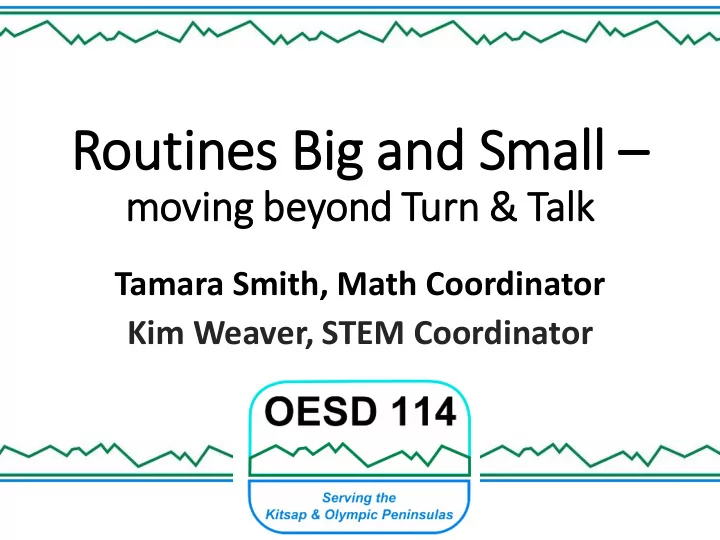

Rou outin tines Big a g and Sm Small l – moving b bey eyond Turn & & Talk Tamara Smith, Math Coordinator Kim Weaver, STEM Coordinator
Routines L Lar arge an and Sm Smal all: Mechanical t to M Methodical to P Pedago gogi gical Tamara Smith, Mathematics Coordinator Kim Weaver, STEM Coordinator
Who’s in t the R e Room • Introductions – at table
Mathematically Productive Instructional Routines
Mathematically Productive Instructional Routines • Routines – these are activities that students and teachers engage in often enough that the routine itself is learned and can be engaged in quickly and meaningfully
Mathematically Productive Instructional Routines • Instructional – these routines are focused on learning content, not on management of students, supplies, or behavior
Mathematically Productive Instructional Routines • Mathematically Productive – these instructional routines engage students in making sense of mathematics and having mathematical discussions. They focus on Content Standards and on the Standards for Mathematical Practice
Why r rout utines? Shifting the culture of what it means to know and do mathematics. Shifting from • Initiation – Response – Evaluation (IRE) • I do – We do – You do – routines for demonstrating and practicing procedures
Core P e Practices es TE TEDD.org • eliciting and responding to students’ ideas, • orienting students to one another and the content • positioning all students as competent learners, and • setting and maintaining high expectations for all students.
Number Ta Talks • Strategy share
63 3 - 28
Number Ta Talks • Strategy share • Reflect on Core Practices
Whi hich O One Do Doesn’t B Belong ng
Othe her S r SMAL ALL r rout utines • Which One D Doesn’t B Belong • Number T Talks • Notice a and W Wonde nder • Debat ate M Mat ath • Splat at • Choral c counti ting • Es Estimation cl clipboard • Es Estimation 180 180
An And n d now f for r … the RE e REST of of t the L LESSON
C ONNECTING R EPRESENTATIONS An Instructional Routine Prompting Structural Thinking (MP7)
C ONNECTING R EPRESENTATIONS WHAT : Connect area models using algebra tiles to quadratic equations WHY : To “ think like mathematicians ,” to use mathematical structure to connect two things that look different.
A A word a d about a algebr bra t tiles • RED pieces indicate negative values • All other colors indicate positive values • Area Sizes : • X 2 • X • One
C ONNECTING R EPRESENTATIONS Think Make Connections Share and Study Connections Create a Representation Reflect on Learning
THINK Ask yourself… “How are the _______ similar/different?” “What are the CHUNKS of these _______”
CONNECT “I saw … so I connected....” “... matches … because...”
SHARE CONNECTIONS “We saw … so we connected....” “... matches … because...” “They paid attention to....” “Their match works because...”
Create a Representation THINK Ask yourself… “What are the chunks of this _____(representation)____”
Create a Representation PAIR Share your representation. Together agree how best to explain your thinking.
Create a Representation SHARE They paid attention to … Their representation matches because...
Reflect on Learning Paying attention to … in algebra tiles is helpful because... When interpreting a quadratic equation, I learned to pay attention to…
Iden entify core p e practices es
Othe her B r BIG r rout utines • Connec ecting R Repres esent entations (MP7) • Capturi uring Q Qua uantit ities es ( (MP MP2) 2) • Recognizing repetition ( (MP8) • 3-Act T t Task asks Implementing r rich tasks u using 5 5 • practices f for orchestrating mathematical d discourse MARS formati tive asse assess ssment c t car ard so sort t • tasks s
Reso sources https://tinyurl.co com/ m/NW NWMC-Routines Tamara S Smith, tsmi mith@oesd114. 114.org Kim W Wea eaver, kweaver er@oes esd114.org
Recommend
More recommend